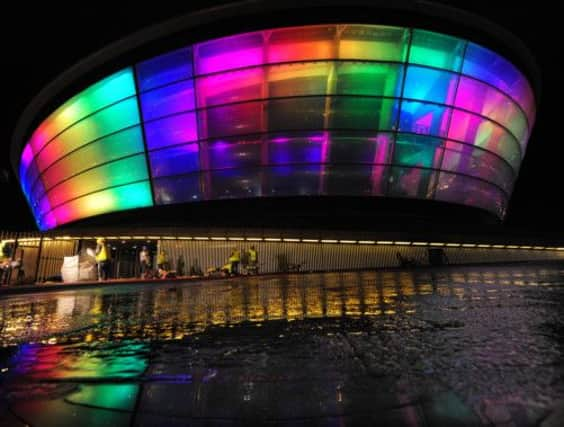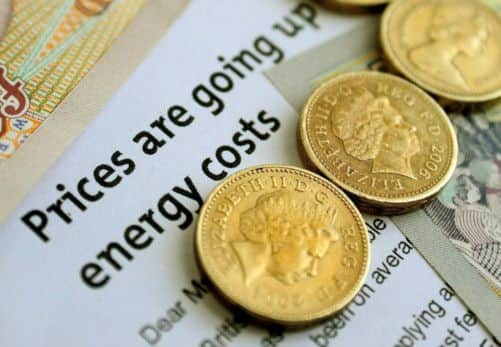Cameron feels heat as SSE hikes energy prices


The Labour leader, who has made energy prices a key policy battleground, said firms were “ripping off customers”.
Economists, meanwhile, warned that the UK’s fragile economic recovery could be in jeopardy as household income is hit by what is likely to be the first in a series of utility bill price rises.
Advertisement
Hide AdAdvertisement
Hide AdAnd the former head of the Office of Fair Trading (OFT) said the UK’s energy market should be investigated immediately by the Competition Commission, Perth-based SSE apologised to customers as it said rising costs had forced it to increase its prices by 8.2 per cent. It blamed government-imposed levies, which go towards green energy, wholesale energy prices and the cost of using newly upgraded networks.


Labour has said that it will freeze energy prices until 2017 if it wins the next Westminster election. But the SNP government has admitted it would rule out a freeze in an independent Scotland, claiming such a move would cause blackouts, price rises and job losses.
The Prime Minister said last year that the UK government would force energy companies to give households the cheapest deals available. Energy Secretary Ed Davey also unveiled plans which will limit gas and electricity suppliers to offering just four tariffs.
Mr Miliband, whose policy was branded a “con” by Mr Cameron, said yesterday the increases reinforced the need for a 20-month freeze on energy prices.
“The government is letting the energy companies get away with it and letting down the British people,” he said. “The companies are putting up prices because we’ve got a broken energy market and they are ripping off consumers.”
The Prime Minister’s spokesman said Mr Cameron “really, really understands” the pressure on family budgets, stressing that the government was already taking action in areas such as rail fares and council tax to prop up living standards.
“Of course, hard-working families are seeing budgets squeezed,” he said. “I think, in terms of what we are doing, there is legislation so that people are automatically put on to the lowest tariff.”
But economists warned the extra cost could tip the balance for consumers’ disposable income, which had been driving Britain’s return to growth, forcing them to rein in a recent return to high street spending.
Advertisement
Hide AdAdvertisement
Hide AdBrian Ashcroft of economic think-tank the Fraser of Allander Institute and emeritus professor at Strathclyde University, said the increase would have an “inevitable” impact on the economy.
“Clearly, real incomes have been falling over the past couple of years because prices have been outstripping average earnings and this latest bill rise is another twist of the skewer,” he said.
“It is a real problem and clearly runs a real risk of dampening down the green shoots of recovery, which have been coming largely from household spending. This price rise could be a key factor in reducing that potential recovery, which is slender already.”
Former head of the OFT John Fingleton said the industry should be referred to the Competition Commission in a bid to restore public trust.
“If our politicians genuinely want to make the UK energy market perform more effectively, and to serve UK consumers, they should support a reference of the market by Ofgem, the energy regulator, to the Competition Commission,” he said.
The SSE increase, which will affect 7.3 million gas and electricity customers UK-wide, comes in at three times the current level of Consumer Price Index (CPI) inflation, the most commonly used inflation rate calculated by the percentage increase in the price of a typical shopping basket, compared to the previous month. The CPI level was 2.7 per cent in August.
Customers in central Scotland will see the smallest increase, of seven per cent, in their dual fuel price. However, those living in the north of Scotland will witness an above average increase of 8.7 per cent.
The rise is the first for almost ten months. Last year, SSE warned it was likely to increase its bills sometime after July this year. In May, the supplier reported a 27.5 per cent increase in year-on-year profits, with retail profits up from £321.6 million to £410.1m.
Advertisement
Hide AdAdvertisement
Hide Ad“It’s particularly disappointing that SSE have done this now, given that their profits went up earlier this year,” said Margaret Lynch, chief executive of Citizens Advice Scotland. “Consumers will find it very hard to understand why they are being forced to pay even more to a company which is doing well.”
Consumer groups warned customers should brace themselves for the other major firms such as ScottishPower and Scottish Gas to follow suit and called for further government reforms of the energy market.
Energy companies need to give at least 30 days notice of price hikes under new government rules, meaning customers have a chance to change supplier before the increase comes into effect on 15 November.
Clare Francis, editor-in-chief at MoneySuperMarket.com, said: “The bill hike from SSE will affect a massive proportion of UK households, all suffering from these heightened prices before the costly winter season.”
SSE’s group managing director for retail, Will Morris, issued an apology for the rise in a statement yesterday morning.
“We’re sorry we have to do this,” he said. “We’ve done as much as we could to keep prices down, but the reality is that buying wholesale energy in global markets, delivering it to customers’ homes, and government-imposed levies collected through bills all cost more than they did last year.”
The company said wholesale energy prices were up 4 per cent, paying to use newly-upgraded networks by 10 per cent and government-imposed levies up 13 per cent.
UK Energy Secretary Ed Davey denied green levies were a major factor in driving up prices, and urged customers to look elsewhere for cheaper bills. “This is clearly unwelcome news for customers of SSE. People should take the opportunity now to make sure they are on the best deal available,” he said.
Advertisement
Hide AdAdvertisement
Hide AdThe Scottish Government’s housing and welfare minister, Margaret Burgess, said the rise was “extremely disappointing”.
Labour MP John Robertson, who sits on the energy select committee, said: “SSE should be broken up so it can’t take advantage of people in this way.”
Tom Greatrex MP, Scottish Labour’s shadow energy minister, added: “Hard-pressed consumers across Scotland are now paying the price for David Cameron’s failure to stand up to the energy companies.”
Case study: ‘I haven’t put the heating on for three years – it’s too expensive’
Scots grandmother Chris McCulloch from Oban is so worried about soaring electricity bills that she never puts her heating on.
Instead, when the temperature drops, Chris, her two grown-up daughters and ten-year-old grandson rely on hot water bottles and blankets to keep warm around the house.
Chris, 56, of Colonsay Terrace, Soroba, Oban, said: “They all get a hot water bottle to warm their bed up and if they are watching the television they have a hot water bottle and a blanket.
“People laugh at me, they think it’s hilarious, but it’s the only way we can do it.
Advertisement
Hide AdAdvertisement
Hide Ad“My electricity was costing me £70 a week in the winter, three years ago, so I haven’t had the heating on for three years. To put electricity up another 8 per cent is ridiculous.”
The part-time cook, who is a SSE customer, says she cannot afford the price of electricity on her low income and added: “I only work 16 hours a week and get £120 and then I have rent to pay, so it’s a case of paying the rent or putting on the heating.”
Ann Robinson: ‘Don’t just sit back, be efficient and switch to a cheaper deal’
This is a crippling blow for consumers, who are still reeling from last winter’s price hike. Adding to an already sky-high energy bill will leave consumers buckling under the pressure. This will be seen by many as the final nail in the coffin for affordable energy.
People are already feeling a squeeze and this takes even more money out that they are now not able to spend on other things. I could see this having a serious effect on the high street and consequently on the overall pace of the economic recovery.
Another consequence could be that energy prices for small and medium sized companies will also rise in the near future. That could mean the difference between being able to hire staff or not for some small firms.
Of course the danger now is that the other big six suppliers will follow suit. What we do know is that bills are in danger of hitting £1,500 a year and that this is a real turning point for consumers. At this level, households will be turning down and switching off in an attempt to keep a lid on their energy costs. While energy efficiency is a good thing, energy rationing is not and the danger here is that people will be forced to sacrifice their health and well-being because they cannot afford adequate heat.
The government and consumers themselves can take measures to dampen the devastation to household budgets. A healthy competitive market is the key to bringing bills down, providing choice to consumers and putting them back in the driving seat. It will keep the suppliers on their toes too.
Advertisement
Hide AdAdvertisement
Hide AdThe market isn’t completely perfect, but there are already some highly competitive fixed price deals available that will allow households to freeze their energy prices for anything up to four winters.
First, I would appeal to other suppliers not to blindly follow suit, but to consider the impact on their customers. But, second, I would also urge consumers not to sit back and watch energy costs soar.
There are two simple steps to protecting yourself from the impact of higher prices: use less energy by making your home more energy efficient and pay less for the energy you do use.
• Ann Robinson is director of consumer policy at uSwitch.com
ELSEWHERE
The Scotsman Conferences is hosting a series of events capturing the many facets of the Scottish independence debate. 3 December sees a formidable line up of expert speakers tackle “The Independence White Paper: A Business Plan for Scotland?” For more details on this and other great events please visit www.scotsmanconferences.com